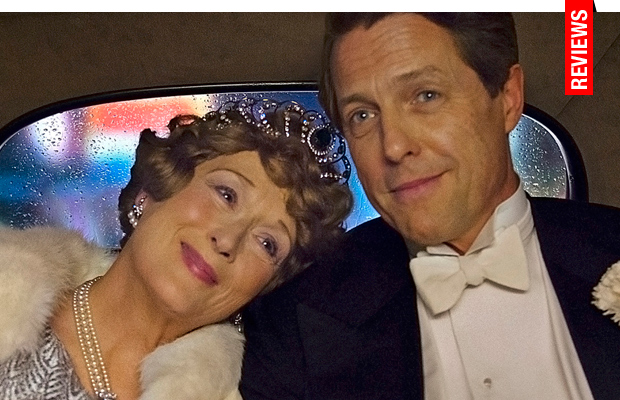Florence and the Machine: Frears Lets the Music Speak for Itself in Curio Biopic
We meet Streep’s Florence as she uneasily descends from the rafters as an angelic muse in the midst of a variety show at a well-attended supper club, directed by her husband St. Clair (Hugh Grant), a failed Shakespearean actor who long ago gave up his dream of excelling at the craft. Florence’s second husband, he’s a titled but moneyless British ex-pat who is engaged in a sex-less but overwhelmingly protective marriage with his wife (we learn she contracted syphilis on her wedding night from her first husband, an incurable infection at the time, rendering her childless and degrading her health). They have a certain understanding, which allows for St. Clair to have his own flat, where he spends nights with his mistress (Rebecca Ferguson). When Florence announces her plans to return to the stage, St. Clair doesn’t bat an eye, but bribes the Met Opera conductor (David Haig) as her coach, and hungry young pianist Cosme McMoon (Simon Helberg) to accompany her. To retain her happiness and passion for music, St. Clair coordinates a fixed high-society audience to attend Florence’s concert, attended only by those who have a bit of tact and understanding about the ruse, which means barring high minded press members (like the bitchy New York Post scribe played by Christian McKay) from attendance. The experience leaves Florence enervated, and she decides to make a recording of her newly rediscovered talent, distributing the records to patrons of the Verdi Club, an organization she created two decades prior. But when her recording accidentally gets into the wrong hands, she becomes an unassuming sensation, leading her to book Carnegie Hall and achieve a dream she hadn’t previously dared to embark upon.
Without a doubt, there’s a bit of difficulty in portraying a woman like Florence Foster Jenkins, who could easily have been painted as a privileged monster or a screeching caricature. Streep imbues the woman with a sense of dignity, enhanced by a series of empathetic exchanges supplied by British scribe Nicholas Martin (a television writer scripting his first feature here). And between warbling like a wounded bird through a series of screeching practice sessions even before we get to the grand denouement of the Queen of the Night aria at Carnegie, Streep flutters and fusses with predictable aplomb, resembling a ripe Silvana Mangano tasked with playing a dowdy hausfrau version of Norma Desmond.
Those who have seen Xavier Giannoli’s 2015 film Marguerite starring a phenomenal Catherine Frot (who won a Cesar for her performance) will note several differences between both the films (Giannoli’s is a satire set in 1920s Paris) and the actors playing the likeness of Jenkins. Frears, once again, proves to be in best form when collaborating with strong female leads, like Glenn Close in Dangerous Liaisons, Helen Mirren in The Queen, or Judi Dench in Philomena. And yet, Streep is not the beating heart of the film despite playing the title character.
A surprisingly adept Hugh Grant manages to be warm without being schmaltzy, morally questionable (at least according to heteronormative standards) without being smarmy, and understandable without being too obviously played. And flanking him is character actor Simon Helberg. Audiences familiar with his work on items such as “The Big Bang Theory” or Jake Kasdan’s The TV Set (2006) should be impressed by his characterization as an effete piano player who mugs splendidly for the camera and provides the perfect (arguably repetitive) foil. Swedish actress Rebecca Ferguson (of the last Mission Impossible venture) and Nina Arianda get their small moments, while Christian McKay gets to play everyone’s favorite scapegoat villain – the insensitive critic.
While this examination of Florence Foster Jenkins isn’t exceptional (the set designs make New York’s city streets look exceptionally tidy and often scrubbed out in faded white), there’s something to be said for a film having the ability for a wealthy white woman from the upper echelons of New York Society to transcend her privilege and be an empathetic underdog. Of course, Frears and Martin accomplish this in the usual way by simply neglecting to directly address it unless couched in frothy instances where class issues are outshined by punchlines (an issue more bitingly addressed in Giannoli’s film). But this primes our ability to be somewhat touched by a woman who hasn’t had the most carefree existence considering her means. “They can say I can’t sing, but they can’t say I didn’t sing,” she observes in a teary exchange with her doting husband. And the significance of a person like Florence Foster Jenkins is as an example of the fulfillment achieved by daring to strive for your dreams, the critics be damned. Bizarre and oddly touching, Frears manages to retain an element of the provocative in a meaningful success story which could have easily been a sappy melodrama.
★★★/☆☆☆☆☆
